Latest News
$1 Billion Invested in Rural Health Care Across 13 States
Posted by on May 5, 2015 at 12:26 PM ESTEd. note: This is cross-posted on the U.S. Department of Agriculture's blog. See the original post here.
In late 2011, the President announced a White House Rural Council initiative lead by the US Department of Health and Human Services (HHS) and US Department of Agriculture (USDA) to invest in rural health and link rural doctors and hospitals to financing for health IT. The initiative was designed to address the need for financing to support the adoption of health IT systems in rural communities. Financing has been cited as one of the top challenges for rural doctors and hospitals serving remote and poor communities.
Between 2012 and 2014, the HHS and USDA led initiative generated approximately $1 Billion in rural health care financing across 13 states. These investments, funded by USDA, included grants and loans to help rural clinics and hospitals transition from paper to electronic health records (EHRs), encourage exchange of health information with health care providers and patients, and offer telehealth services.
Since it launched in 2012, the initiative has expanded access to financing for rural health care needs through cross-government collaboration and partnerships with non-Government organizations—including bringing together diverse teams to achieve common goals and using existing programs in innovative ways.
Learn more about RuralPresident Obama Welcomes Chabad-Lubavitch to the White House
Posted by on April 27, 2015 at 7:21 PM EST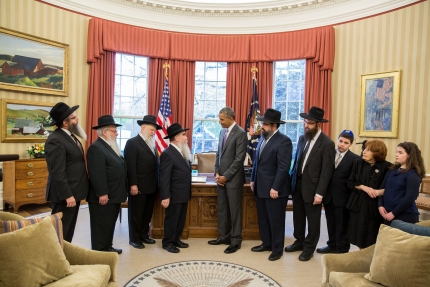
President Barack Obama presents a ceremonial copy of the Education and Sharing Day Proclamation that he issued on March 31, 2015 to a delegation from the American Friends of Lubavitch in the Oval Office, April 27, 2015. (Official White House Photo by Pete Souza)
On Monday, April 27, President Obama welcomed a delegation from Chabad-Lubavitch into the Oval Office to commemorate Education and Sharing Day, USA. Established by Congress in 1978 to honor the life’s work of Rabbi Menachem M. Schneerson (1902-1994), the Lubavitcher Rebbe, Education and Sharing Day provides an opportunity to focus on education's importance and recognize the contributions Rabbi Schneerson made during his lifetime in the fields of education and morality, ethics and justice.
Since the establishment of Education and Sharing Day, which occurs on the Rebbe’s birthday, every President has issued an annual Proclamation marking "Education and Sharing Day, USA". This year’s Education and Sharing Day Proclamation acknowledges the emphasis Rabbi Schneerson placed on the education of girls, noting: “In an era where a woman's education was not valued the same as a man's, the Rebbe worked to tear down barriers that stood in the way of girls who wanted to learn.”
A Piece of the Puzzle for Caring Families
Posted by on April 24, 2015 at 12:53 PM EST
Netsy Firestein is being honored as a Working Family Champion of Change
Almost thirty years ago when my older daughter was born, I got 3 months of fully paid maternity leave from the labor union where I worked. At the time, I had no idea how lucky I was. Later I learned the United States has NO national paid parental or family leave program. Today we are the only industrialized country in the world with no national policy even of paid maternity leave.
After thirty years, the reality has changed for millions as we won family leave insurance programs in three states (California, New Jersey and Rhode Island). I led the Coalition that helped to pass the California law in 2002 that provides up to 6 weeks of partial pay through a state insurance program—almost every employee in the state makes modest contributions to the program. An employee can receive wage replacement to bond with a new child or to care for a seriously ill relative—we recently expanded the law to have a more realistic definition of family, so that it covers parents, children, spouses, siblings, parents in law, grandparents and grandchildren.
However, this leaves out the other states. And paid family leave is only one piece of the puzzle for working families. We need to knit together our policies for caring for our families – our leave policies, our child care system and our workplace standards like paid sick days, minimum wage and work hours. Too often we address one issue at a time. But families are dealing with every issue, every day.
Today, families are left to fend for themselves and patch together time off from work and care for their children while they work. It is seen as a “private” issue, when in fact it is a public problem that we need to fix together.
We have a system of care that leaves many of the caregivers in poverty – those who care for our children as well as those who care for our elders. We leave our loved ones in the care of providers who, even with higher education levels, often make close to minimum wage. What does that say about how we value families?
The research is there – the importance of brain development in very young children; the need for parent/child bonding; the huge benefits of early childhood education; the needs of working parents to have affordable and accessible child care; the link between good wages for child care providers/teachers and high quality care; the impact on families of low wages and erratic work schedules.
Let’s be big and bold. Everyone says family comes first, right? So let’s put our money where our mouth is. Let’s have a national conversation about putting the pieces of the puzzle together for children and families: A national family leave insurance program; a higher minimum wage including full time hours for those who want it; paid sick days; and a well-funded, high quality child care and early education system at little or no cost to parents.
Netsy Firestein is a Senior Fellow at UC Berkeley Institute for Research on Labor and Employment. Previously she worked with the California Work and Family Coalition to pass paid family leave and other family friendly laws in California.
Making the American Dream Attainable for Everyone
Posted by on April 24, 2015 at 12:48 PM EST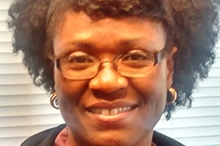
ReShonda Young is being honored as a Working Family Champion of Change
It was a great surprise to receive a phone call from the White House, notifying me that I had been chosen as a Working Families Champion of Change. As I go about my business, doing what I believe to be the right thing to do for our employees, I really never thought I was doing anything special. My goal has always been to make sure that our workers have a fair shot at living the American Dream. The "American Dream" should be something that is attainable for everyone who chooses to work hard and play by the rules.
When I started fighting for health care reform in 2009, I did so because the failed system that was in place made health insurance unaffordable for my dad's small business to provide health insurance for our employees. The policies we were shown also denied health benefits for several of our employees due to pre-existing medical conditions, or for being overweight. Knowing that most of our employees had no health insurance in place, and had no way of paying for it on their own, was a huge concern for us. We knew that an illness or an accident could put our employees in a situation where they had to choose between getting the medical care that they need, and paying their rent/mortgage, utilities, or buying food. Those aren't choices anyone should have to make. Working with the Iowa Citizens Action Network and the Main Street Alliance allowed me to have a voice. Being able to testify before Congress about the need for health care reform in 2009 attracted enough attention for us to be able to get better options presented to us, and a health insurance plan in place for our employees that did not exclude their pre-existing conditions.
Another area that has been a huge issue for me in trying to make sure that not just our workers, but workers in general, have a fair shot at attaining the American Dream is bringing attention to the need for an increase in the minimum wage. Although we do not pay our employees minimum wage, we are directly affected by the minimum wage. Minimum wage jobs put us at a disadvantage when we are bidding for jobs against employers who pay minimum wage. It also affects my retail business. A lot of minimum wage workers don't have the disposable income to be able to patronize my business. We often are asked if we accept food stamps, which shows there is interest in our product. Unfortunately, we do not meet the guidelines to be able to accept food stamps.
Finally, there is a great need for things to change for women. When a woman is working the same job as a man, with the same education and qualifications as a man, and is only earning $0.77 to $0.78 to every $1 the man is earning, we have an issue that is not only a woman's issue, but a family issue, and an economic issue. I have fought to make sure women at our companies are paid the same as our male counterparts. That has not always been the case, but awareness is key, which is why I believe the Paycheck Fairness Act is critically important.
I will continue to fight for these issues, and others. As long as equality is not a reality, none of us are truly able to live the lives we are meant to live.
ReShonda Young is the Operations Manager and Corporate VP for her dad's businesses, Alpha Express Inc. and Alpha Services Inc., based out of Waterloo, IA. She is also the founder and owner of Popcorn Heaven, a gourmet popcorn store with headquarters in Waterloo, IA.
My parents couldn’t earn sick days. Now I’m making sure everyone in New Jersey can.
Posted by on April 24, 2015 at 12:43 PM EST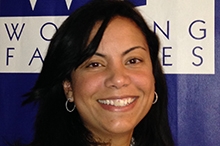
Analilia Mejia is being honored as a Working Family Champion of Change
In New Jersey, 1.2 million workers are unable to care for themselves or their family when illness strikes. This creates an impossible situation for the parent who faces a shortened paycheck and a sick child who should be cared for at home. It also hurts local economies, because every shortened paycheck means groceries left unpurchased. And it threatens our public health when a sick worker feels forced to come into work.
As a child, I often watched my parents make that impossible calculus: care for my sister and myself or make the mortgage payment that month. Take my grandfather to the doctor, and risk a smaller paycheck, or push an appointment back. This issue hits home for far too many in my home state of New Jersey. Medical care goes unsought and illness is spread unnecessarily.
All of this can be prevented with a simple policy that allows all workers to earn time they can take when the inevitable happens.
Two years ago, advocates across New Jersey decided it was time to tackle a problem that plagues far too many workers, particularly those who are most vulnerable due to low wage work, or at the forefront of public health in the service sector industries.
Our strategy is simple: bring the fight to local voters, and show state legislators that the policy works and the voters stand behind it. In September 2013, Jersey City became the first city to pass an earned sick time law. The bill included a call for a study, which researchers released last week. It proves that productivity actually increases for employers as a result of mandated compensated earned sick day policies. In 2014, five New Jersey municipal councils passed identical earned sick time laws. Each of these victories helped build momentum towards a statewide bill, and in fact led to New Jersey Assembly and Senate leadership announcing their renewed support for the legislation and advancing the state bill through the legislative process.
Next, we set out to prove that local voters had a strong appetite for the proposal. In November of 2014, we placed the question on the ballot in two municipalities, where it garnered 75% and 86% of voter support. Because of our strategy, more New Jerseyans are better informed on the policy, elected officials now view it as a critical issue for their constituents, and advocates have local data to show that we all do better when workers have the ability to care for themselves and their families and still make ends meet. These victories have also made a meaningful difference in the lives of over 150,000 workers across our great state who can now breathe a little easier when illness strikes.
With President Obama’s leadership, we hope to make earned sick days a reality for all Americans.
I feel honored every day to lead New Jersey Working Families, and continue to fight to bring equity and fairness for all working families across this state. We fight for a New Jersey in which democracy matters more than corporate money, in which workers make a family sustaining wage and in which the decisions of public officials reflect the values and priorities of the voters who elected them. I do this work not only for the millions who make this state great, but also for the child I used to be. I wasn’t able to help my parents grapple with the struggles that low wage work and poverty created for them, but I sure can help ease those struggles for others today.
Analilia Mejia is the Executive Director of the New Jersey Working Families Alliance, a statewide nonpartisan organization that seeks to promote and defend the interest of New Jersey’s working families.
Kids: Our Best Product – Participating in the Champions of Change for Working Families event at the White House
Posted by on April 24, 2015 at 12:40 PM EST
Rose Marcario is being honored as a Working Family Champion of Change
It’s an honor to be recognized by President Obama for our commitments to working families. I share this gratitude with Malinda Chouinard, who has always made Patagonia a great place for families, and with Anita Furtaw, who developed an award-winning on-site child development program for our Ventura headquarters 30 years ago, and has run it ever since.
We’re happy to serve as a model for other companies who want to do the right thing by their employees. It’s a necessary element of doing business in our time. To support our families, Patagonia provides company-paid health care and sick time for all employees, paid maternity and paternity leave, access to on-site childcare for many employees, and financial support to those who do not have access, among other benefits.
I came to Patagonia in 2008 after working in businesses where I had to relegate my own desire for social and environmental change to nonworking hours. It was my hope, in coming to Patagonia, that I’d be able to engage my whole self as a person and a citizen in my workaday life. But I was also skeptical. I wanted to see for myself whether the company’s values were possible to live by in a competitive business.
Patagonia’s child-care program was my first visible proof of this possibility and it is still—despite all our work to improve social practices and reduce environmental harm in the supply chain—the most striking.
Some benefits of onsite childcare are obvious. The children are lively, curious and happy. As Anita Furtaw has said, “When kids are in the same place and have the ability to trust the adults around them to love them and care for them, they have the energy to do what they need to do in all areas of development. They become more articulate and tend to have higher self-esteem.”
The benefits to the parents and grandparents are also visible: they can see, and be with, their kids during the day and have an engaging work life without sacrificing their lives as parents. Our program also includes traveling caregiver support for those with kids less than a year old.
One benefit is less obvious: the presence of the children transforms the workplace into a community for all employees. The kids and the sounds of their laughter are reminders that it is the purpose of work to honor our human as well as our business responsibilities.
Business results from these investments are significant. For example, employee turnover costs companies up to 150 percent of the base salary of the person exiting. An astonishing 43 percent of women with children leave careers or take extended time away from work after having kids. At Patagonia, nearly all employees return to work after a standard parental leave.
After more than 30 years, we’ve begun to hire quite a few kids who grew up with us. And Anita Furtaw, a tireless champion for our employees and their kids, recently laid the groundwork for a similar center at our facility in Reno to support 400 additional employees.
We face so many challenges today as citizens and businesspeople. In a changing world, it’s vital to be an agent of change—and to have that capability in the workplace as well as in private life. I’ve been able to realize that possibility at Patagonia, where I can put my heart and soul into my work. The credit goes, in part, to the kids of my talented colleagues who keep us all grounded. Any business that wants that commitment from its people should take note—and follow suit.
Rose Marcario is the President and CEO of Patagonia, Inc. and Patagonia Works.
Working matters. Families matter. Paid sick days matter.
Posted by on April 24, 2015 at 12:34 PM EST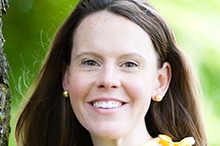
Melissa Broome is being honored as a Working Family Champion of Change
It’s an all too familiar story understood by every working parent. In the wee hours of the morning, you’re jolted awake by the sound of cries on the baby monitor. Sleep deprivation is often an uninvited friend, but this time is different. The crying is different. Something is wrong.
We’ve all been there.
For me, it was an October morning. My baby girl was not quite 18-months-old. When I went in to get her, she was clammy with fever and had thrown up in her crib. I knew right away I wouldn’t be going into the office that day. I made the choice to stay home, and thank God that I did.
In a matter of hours, my daughter’s fever spiked dramatically, leading to a febrile seizure. She was in my arms when the seizure happened. She was in my arms during that terrifying ambulance ride to the hospital. She was in my arms when the doctors eventually assured me that she was going to be OK.
Nothing can prepare you for the excruciating moments of terror that come when your child faces a health emergency. Yet, looking back on that day, I know that I am one of the lucky ones. My ample supply of paid sick days meant that I didn’t think twice about staying home with my daughter.
For too many working parents across our great nation, this is not the case. When I juxtapose my experience with the experience of moms like Monica in Seattle, I am struck by the similarities and haunted by the differences. Immediately after Monica’s youngest son spiked a fever that led to a seizure, she had to decide to report to work or deal with the repercussions of not getting paid. Her choice was one that no parent should have to make.
Stories like Monica’s are happening across our country every day. Hardworking moms and dads have to choose between staying home with their sick children and earning the income they need to keep their families afloat.
In 2015, we know that in the majority of our country’s households, both parents are working outside the home. And yet, our public policies continue to reflect a 1960s mentality. We remain the only industrialized country in the world that doesn’t guarantee workers the ability to earn paid sick days. Forty percent of American workers – more than 43 million people – are denied this basic workplace protection.
In my home state of Maryland, more than 700,000 workers are unable to earn a single paid sick day. We launched Working Matters: The Maryland Campaign for Paid Sick Days in 2012. Since then, we have grown to become a powerful statewide coalition of more than 135 businesses, organizations and faith groups committed to passing the Maryland Healthy Working Families Act. The legislation, which was cosponsored this year by nearly 100 members of the Maryland General Assembly, would allow workers to earn up to seven paid sick days per year.
While there are many political issues that divide the American people, we are undoubtedly united by an innate desire to care for our families. Thankfully for Monica, Seattle passed a paid sick days ordinance in 2011. Policymakers in Maryland – and throughout the country – need to follow suit.
Melissa Broome is acting executive director of the Job Opportunities Task Force (JOTF) where she helps to lead Working Matters: The Maryland Campaign for Paid Sick Days.
Recognizing Tribal Climate Action
Posted by on April 22, 2015 at 4:43 PM ESTThe White House launched the Climate Action Champions program in late 2014, in partnership with the U.S. Department of Energy. After a competitive application process, the Department of Energy designated 16 communities as Climate Action Champions, including two tribes: the Sault Ste. Marie Tribe of Chippewa Indians (Michigan) and the Blue Lake Rancheria Tribe (California). These tribes were selected for their local leadership in climate mitigation and adaptation.
Native American communities have a long history of determination and hard work to maintain their cultural and economic resilience. As it turns out, these same traits are needed for climate resilience. Traditional strengths of tribal communities’ include local self-reliance, environmental stewardship that respects the carrying capacity of the land, and strengthening community. These strengths are now valued attributes for coping with current and future changes.
The Sault Tribe is the largest native tribe east of the Mississippi River. It constitutes one of four Tribes and First Nations that form the Anishnabek community of the rapids of the St. Mary’s River.
The Sault Tribe is guided by the Seven Grandfather Teachings (Love, Wisdom, Bravery, Truth, Honesty, Respect, and Humility) in its leadership and community development. Responding to the threats presented by a changing climate, in particular, requires ‘Aak wade ‘ewin’ – Bravery - in facing the changes that will be coming to our children and grandchildren. As tribal chairperson Aaron Payment said, “We are part of the ecological system. It is an illusion to think we have dominion over our Aki [earth].”
Energy Strategy
The Sault Tribe has developed several strategic level plans to mitigate and adapt to climate change. The Energy Strategy (2012), in particular, calls for a strategic approach in several areas, including: demanding reduction in all energy uses, installing renewables sized and located to best meet demand, reducing reliance on the grid infrastructure and reducing vulnerability to catastrophic events. All available renewable options will be utilized and distributed across the demand centers of the seven counties to increase resilience of supply. The long term goals are to produce power from renewables to supply all power needs of the Tribe, export to the grid to offset all purchased energy (including transportation energy), and be a net-zero greenhouse gas emitter. Mother Earth demands this of us and we feel strongly that this is the right thing to do.
The Sault Tribe’s Energy Strategy has a bold long-term goal: “No Net Purchased Energy.” This means that for any energy the Tribe must purchase for its operations (including vehicles and flights), an equivalent amount of energy will be produced for export to the grid for other users. The staged approach that is detailed in this Strategy first calls for aggressive measures to reduce energy consumption before taking broad scale action with renewable energy. Planned efforts in the next three years include demand reductions of 4% per year.
Leading Regional Climate Collaboration & Action
The Sault Tribe has taken a leadership role in negotiating the groundbreaking Michigan State/Tribal Climate Accord, an agreement that sets out collaboration and consultation between the state of Michigan and the twelve tribes within its borders. The Tribe is also a leader and signatory to a treaty with the three other Tribes and First Nations bordering on the St. Mary’s River and the international border. This treaty calls for the formation of an Aboriginal Joint Commission to work toward the long term sustainability of the St. Mary’s River ecosystem. We believe this is the first such treaty and Commission of its kind.
We are a resilient people. We are committed to combatting the local impacts of climate change, and are proud to have been recognized as a Climate Action Champion. While there is still great progress to be made, we hope that our leadership will help other tribes and communities to deliver local climate action.
Some of the Sault Tribe’s achievements in climate mitigation and Adaptation to date include:
Climate Mitigation
- Lighting retrofits to 21 Governmental buildings (2011/12) totaling 11,790 lamps in 5,485 fixtures illuminating 473,747 square feet of building space.
- Every rental home has had new Energy Star windows, high efficiency boilers and water heaters, insulated steel entry doors, foam insulation, wrap, and siding, and low flow showerheads and toilets in the past six years – 438 homes.
- The three road vehicles in the Fisheries fleet all operate on waste cooking oil fuel.
- Waste reduction (methane reduction) initiatives include recycling of paper, glass, and cans in all Government buildings, Casinos, and enterprises, and curbside collection in all housing sites. A compost demonstration site and rain barrel demonstrations are set up at Environment Program operations.
Climate Adaptation
- Vulnerability assessments have been carried out for significant clan animals.
- Wetland Strategy written and being implemented.
- Establishment of native species seed bank with 111 collections of 13 species collected to date.
- Establishment of Traditional Foods program (gardening, gathering, preserving lessons) to both increase self-reliance and also (mitigation) to reduce food miles travelled and thus energy consumption. Community gardens have been planted, community kitchens established, canning and preserving lessons taught. Fruit trees and berry bushes have been planted in schoolyards and communities throughout the seven county service area.
Blue Lake Rancheria Tribe, California
The Blue Lake Rancheria Tribe of California is a federally recognized Native American tribal government and community located in far northwestern California within Humboldt County, ~6 miles inland from the Pacific Ocean coastline.
The Tribe, its government, elected leaders, and staff have made significant progress implementing greenhouse gas (GHG) reduction measures while improving community resiliency. Since 2008, the Tribe has been focused on strategic climate action planning and implementation of a wide range of projects that work in concert to reduce GHGs and improve community and regional security.
The overall strategy consists of maximizing energy efficiency, and in parallel, implementing energy resiliency measures. Such measures include onsite back-up generation and emergency power, transitioning from fossil to renewable energy to ultimately achieve 100% renewable energy use on the Rancheria, zero net GHG emissions, and actions to ensure operations for critical infrastructure and resource security for business-as-usual and short- and long-term emergency situations.
The following are just a few of the illustrative climate mitigation and adaptation actions that the Blue Lake Rancheria Tribe has achieved since 2011:
- Formation of the Tribe’s formal Department of Energy and Technologies, Office of Emergency Services, and Wildland Fire Department
- Completed FEMA Tribal Emergency Operation Plan, multiple facility-level emergency response plans, Tribal Flood / Dam Break Response plan, transportation and evacuation plans.
- Tribal leader and tribal staff trainings, including FEMA trainings, and CalEMA continuity of operations training, and emergency communications training.
- Energy audits and feasibility studies of conversions from fossil fuel to renewable energy (biomass, solar, hydroelectric, wind, waste-to-energy); waste characterization study
- Led a community-wide forum on “Climate Change Mitigation & Adaptation”
- Completed >15 energy efficiency programs including upgraded HVAC, fans, freezer and refrigeration and lighting replacement, gas station canopy lighting, complete tribal government office upgrade, including upgraded refrigeration/fans and replacement of all hard-wired fluorescent lighting and inefficient screw-in light bulbs
- Installation of solar arrays for low-income residences on the Rancheria
- Installation of electric vehicle charging stations
- Installation of biodiesel manufacturing using waste oil from the Tribe’s kitchens
- Agreement with the American Red Cross to act as a shelter-in-place
- Implementation of a 175kW biomass distributed generation fuel cell renewable energy system
Green Fuels
The Tribe has a particular focus on transition to green fuels. Partnering with Humboldt State University engineering students on feasibility, the Tribe found that biodiesel manufacturing had environmental and economic benefit. For example, using waste oil from its own commercial kitchens, the Tribe fueled its public transit buses. The transit program saved thousands per year and achieved significant GHG reductions even with a 20% biodiesel blend. Fully operational now, bus performance has also been excellent – gas mileage has remained the same and the engines are running smoothly. The other primary fuel-switching project to date has been transitioning the tribal fleet to electric vehicles and installing two Level 2 electric vehicle charging stations. The Tribe ultimately seeks to power both the biodiesel plant and the electric vehicle charging stations with renewable energy produced onsite.
Solar & Microgrid
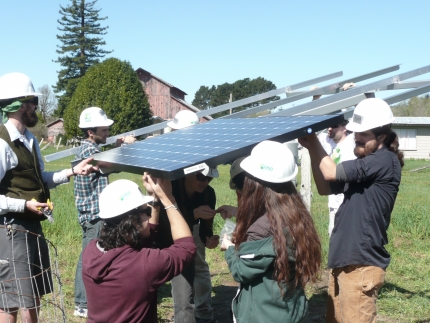
Blue Lake Rancheria: Volunteers install residential solar in the community (March, 2015) Photo Credit: GRID Alternatives
The hope of utilizing solar and microgrid will become a reality in the next two years as the Tribe implements a ~.5 MW solar array and a microgrid control system. Estimated to be complete in 2017, the Tribe’s microgrid will provide for greater demand response and peak shaving in a business-as-usual mode. In emergency situations, the microgrid will operate in islanded mode, separate from the grid, and allow the Tribe to provide the region with emergency power for as long as it is needed.
Partnerships
The Tribe’s partnerships at the local, regional, state and national level are the most important component of the Tribe’s ability to carry so many projects forward in a relatively short time. The local expertise in engineering and environment at Humboldt State University, the Schatz Energy Research Center, and the Redwood Coast Energy Authority have been the primary determining factor in the success of the Tribe’s energy efficiency, renewable energy, and green fuels projects. On the state level, the California Energy Commission, Pacific Gas & Electric utility, and individual project partners such as GRID Alternatives have provided outstanding strategic funding and operational assistance. On the national level, the U.S. Department of Energy, Office of Indian Energy Policy and Programs, U.S. Department of Interior, Bureau of Indian Affairs, U.S. Department of Agriculture Rural Development, and other important agencies such as the National Oceanic and Atmospheric Administration, U.S. Environmental Protection Agency, and the U.S. Department of Transportation - among many others - have provided significant and ongoing support and guidance. Lastly, the Tribe has been fortunate in its public/private partnerships as well, with several private technology partners who have contributed financially, technically, and operationally to various projects.
The Climate Action Champion recognition is a true honor, and the Blue Lake Rancheria Tribe hopes that by sharing some of its work, it will generate ideas and projects in other small communities. As Vice Chairperson Arla Ramsey commented, “The Tribe hopes to serve as an example that a very great amount of climate action can be done, in a very short time, by making best use of limited resources.”
We hope, on this beautiful Earth Day, that our work (and the work of our respective tribal governments, our fellow Climate Action Champions, and everyone who is working toward a stable planet) shines light on what actions are possible – right now – to fight climate change and deal with the impacts that are already here. We wish you a very good Earth Day.
Kathie Brosemer is an Environmental Program Manager at Sault Ste. Marie Tribe of Chippewa Indians and Jana Ganion is the Energy Director at Blue Lake Rancheria, California.
Learn more about Energy and Environment
- &lsaquo previous
- …
- 4
- 5
- 6
- 7
- 8
- 9
- 10
- 11
- 12
- …
- next &rsaquo


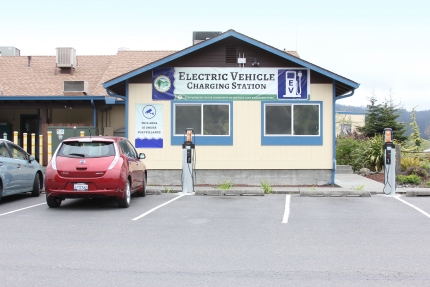
Twitter